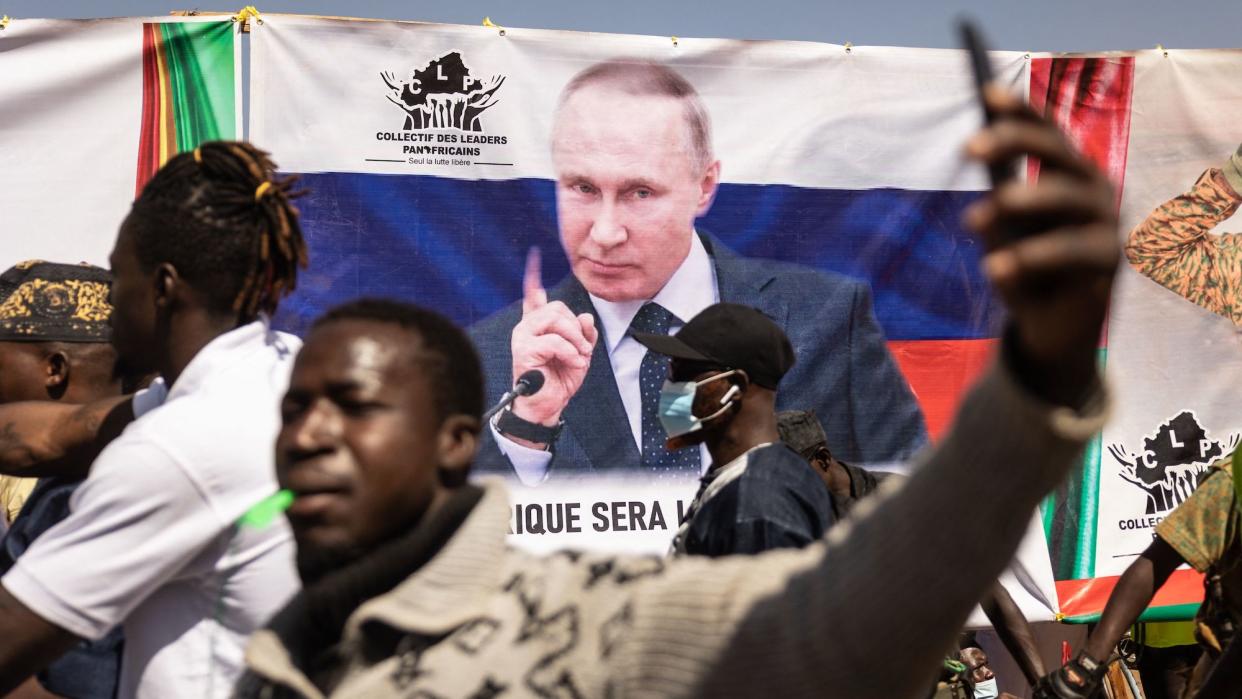How the Russia-Ukraine conflict has spread to Africa

- Oops!Something went wrong.Please try again later.
As the stalemate between Russia and Ukraine continues, the war is changing life not only in Europe but also in countries across Africa.
Russia has claimed "growing influence" in Africa in recent years, said Gavin Mortimer in The Spectator, but more recently it has "become evident" that Moscow is "creating chaos in the continent as part of a calculated strategy to destabilise Europe". In particular, Vladimir Putin has sought to extend his reach in western and central Africa, and to gain access to the region's resources.
Ukraine has also looked to "strengthen its alliances" in Africa, to counter the growing Russian influence, said Alexis Akwagyiram on Semafor. Volodymr Zelenskyy will make his first state visit to the continent over the coming months, and Ukraine plans to double the number of its embassies there.
Why is Africa so important?
The desire to gain influence in Africa shows a "growing appreciation of the role played by the continent in geopolitical affairs", said Akwagyiram. The "value of African alliances" – and Russia's traction on the continent – was underscored when 17 of the 54 African countries in the United Nations abstained from a 2022 vote condemning Russia's invasion. That "made it clear that international condemnation of Moscow was not universal".
Russia can exploit instability in Africa to "trigger further political destabilisation" among its Western enemies, particularly with increases in mass illegal migration from the continent, said CNBC. Moscow also views African nations as a gateway to accessing "strategically important natural resources".
What are Russia and Ukraine doing?
Russia's modus operandi has so far been to "prop up shaky regimes with weapons and disinformation in exchange for diamonds and gold" via its Wagner Group mercenary force, now rebranded as Africa Corps, said Lisa Klaassen at The New Statesman.
Countries in western and central Africa have been "neglected" by the West, and Russia has ostensibly been "walking through doors left wide open by former colonial powers", including in the Central African Republic, Niger, Mali, Burkina Faso and Sudan, where anti-European feeling is stoked by propaganda.
The influence of Russia has been felt pertinently in Sudan, where a bloody civil war continues to rage, with reports of Russian Wagner mercenaries aligned with rebel forces. Ukraine appears to have since aligned itself with government forces in Sudan, to try to "strike at Russian interests far beyond the Ukraine war's frontlines", said The Guardian.
Both Russia and Ukraine have attempted to win over governments with deliveries of grain and humanitarian aid, and Ukraine is expanding its shipment programme to "counter the impression that Russia is the only side in the conflict trying to address the impact on Africans", said Akwagyiram.
Both countries have also "sought to recruit fighters" from Africa, said Military Africa. Many young Africans "facing bleak economic prospects at home" are drawn in by the "promise of high pay and even Ukrainian citizenship after the war", while "estimates suggest thousands" of Africans have been recruited for Russia, potentially through the Wagner Group.
What next?
There is a growing feeling that Russia "appears to be winning the hearts and minds of Africans", said Mortimer.
But while Russia may be succeeding in attracting alliances with other authoritarian regimes, Ukraine can find fertile ground in appealing "directly to Africans on issues which Moscow cannot reach", wrote Ray Hartley and Greg Mills in the Kyiv Independent. Democracy is the "strongest selling point" among young Africans, and for Ukraine to lose the war would have "strategic implications for the democratic world" that would be "both profound and negative".

